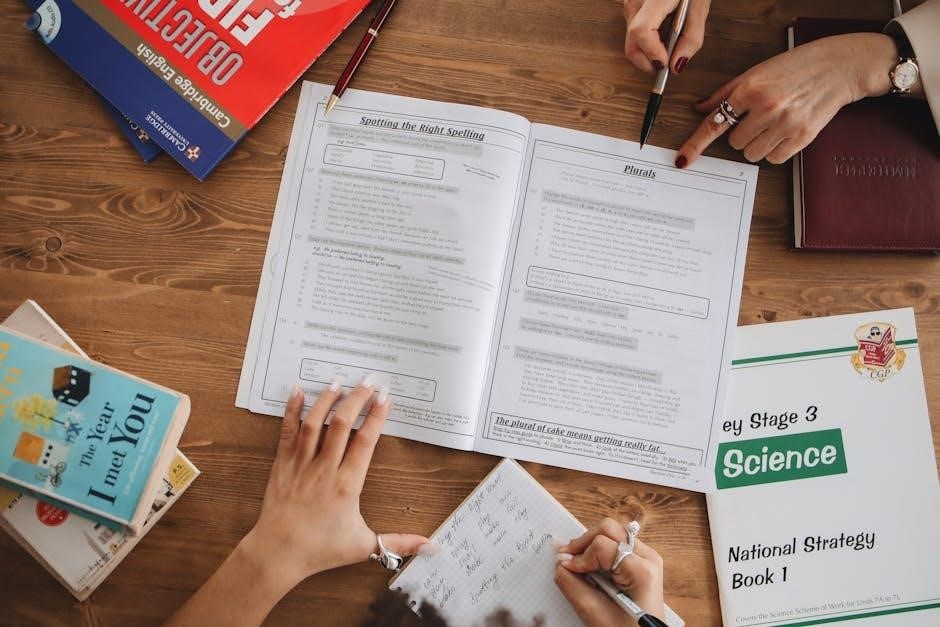class b license florida study guide

The Class B CDL in Florida is essential for operating heavy trucks and buses, excluding trailers․ It requires a study guide and prepares drivers for various roles in the trucking industry․
1․1 Overview of the Class B CDL
A Class B CDL in Florida allows drivers to operate heavy trucks and buses with a GVWR of 26,001 lbs or more, excluding trailers․ It is essential for trucking careers, requiring a study guide to understand regulations, safety, and vehicle operation․ The Florida CDL Handbook is a key resource for preparation, covering state-specific rules and federal guidelines․ This license is crucial for those seeking roles in logistics, construction, and public transportation, enabling them to drive large vehicles safely and efficiently․
1․2 Importance of the Class B License for Truck Drivers
A Class B license is crucial for truck drivers in Florida, enabling them to operate heavy vehicles like buses and large trucks․ It opens doors to diverse job roles in logistics, construction, and public transportation․ With a Class B CDL, drivers can handle vehicles with a GVWR of 26,001 lbs or more, excluding trailers․ This license is essential for advancing in the trucking industry, offering better salary prospects and career stability․ It ensures drivers meet federal and state safety standards, making them eligible for specialized positions;

Eligibility Requirements for a Class B License in Florida
To qualify for a Class B CDL in Florida, applicants must be at least 21 years old, pass a vision test, and meet medical standards․ They must also provide proof of residency, complete required paperwork, and hold a valid Florida driver’s license․
2․1 Age and Residency Requirements
Applicants for a Class B CDL in Florida must be at least 21 years old to drive interstate and 18 years old for intrastate operations․ Residency requires providing proof of Florida residency, such as a utility bill or lease agreement․ Non-citizens must provide valid immigration documents․ Meeting these requirements ensures eligibility to proceed with the licensing process, as outlined in the Florida CDL Handbook and related study guides․
2․2 Medical Certification and Physical Exam
Applicants for a Class B CDL in Florida must undergo a physical exam by an FMCSA-certified medical examiner․ This ensures they meet federal health standards․ The exam evaluates vision, hearing, blood pressure, and overall health․ A medical certification must be submitted to the Florida DHSMV and kept current․ This process is detailed in the Florida CDL Handbook and supported by study guides, ensuring drivers are fit to operate heavy vehicles safely and legally․
2․4 Entry-Level Driver Training (ELDT) Regulations
Effective February 7, 2022, the FMCSA’s ELDT regulations require new Class B CDL applicants to complete certified training․ This includes both classroom and behind-the-wheel instruction, ensuring drivers meet federal safety standards․ The Florida CDL Handbook and study guides provide detailed information on these requirements, helping applicants prepare for the mandatory training and licensing process․ These regulations aim to enhance road safety by ensuring all new drivers receive comprehensive training before operating heavy vehicles․
Study Materials for the Class B License Exam
Key resources include the Florida CDL Study Guide 2025-2026 and exam prep books with practice questions․ The Florida CDL Handbook is also essential for preparation and understanding requirements․
3․1 Florida CDL Handbook and Study Guide

The Florida CDL Handbook is a comprehensive resource for Class B license preparation․ It covers state-specific regulations, traffic laws, and safety guidelines․ The study guide includes detailed sections on vehicle inspection, cargo management, and safe driving practices․ Additionally, it provides practice questions and answers to help candidates familiarize themselves with the exam format․ Using the handbook ensures that applicants are well-prepared for both the written and skills tests required for obtaining a Class B CDL in Florida․
3․2 Recommended Study Guides and Prep Books
Supplementing the Florida CDL Handbook, prep books like the CDL Study Guide 2025-2026 offer full-length practice tests and detailed explanations․ These resources are designed to help candidates master the exam format and content, ensuring a high level of preparedness․ They cover all CDL classes, including Class B, and provide insights into the latest regulations and testing requirements․ Using these study materials increases the likelihood of passing the Class B license exam on the first attempt․

Understanding the Class B License Exam
The Class B license exam in Florida includes a written test on regulations and safety, plus a skills test to assess driving and maneuvering abilities․
4․1 Written Test Format and Content
The Class B CDL written test in Florida evaluates knowledge of truck safety, regulations, and traffic laws․ Candidates must pass with a score of 80% or higher․ The exam covers vehicle inspection, cargo securement, and hazardous materials handling, ensuring drivers are well-prepared for safe operations․ Study guides, like the Florida CDL Handbook and prep books, provide detailed content to aid in exam preparation․
4․2 Skills Test Requirements
The Class B CDL skills test in Florida assesses practical driving abilities․ It includes a pre-trip inspection, basic vehicle control, and on-road driving․ Applicants must demonstrate proficiency in maneuvering heavy vehicles safely․ The test is conducted in a designated area and on public roads․ Study guides and training programs, like those from Miami Dade College, help prepare for these skills․ Passing the test is mandatory to obtain the Class B license, ensuring drivers are capable of operating heavy trucks and buses effectively․
Preparing for the Class B License Exam
Utilize practice tests and sample questions from the Florida CDL Study Guide to familiarize yourself with the exam format and improve your knowledge retention for the Class B license․
5․1 Practice Tests and Sample Questions
Practice tests and sample questions are crucial for preparing for the Class B license exam․ They help familiarize you with the test format and content, reducing exam-day anxiety․ The Florida CDL Study Guide 2025-2026 and other prep books provide full-length tests and detailed explanations to improve understanding․ Focus on areas like road safety, vehicle inspection, and traffic laws․ Regularly taking these tests ensures you identify and address weaknesses before the actual exam, boosting your confidence and readiness to pass on the first attempt․
5․2 Tips for Passing the Exam on the First Attempt
To pass the Class B license exam on the first try, thoroughly study the Florida CDL Study Guide 2025-2026 and related materials․ Understand the exam format and focus on high-weight topics like road safety, vehicle inspection, and traffic laws․ Utilize practice tests to identify weaknesses and improve accuracy․ Manage exam-day stress by arriving early and staying calm․ Read questions carefully, and ensure you understand each one before answering․ Consistent practice and a strategic study plan are key to success․
Endorsements for a Class B License
Class B licenses in Florida may include endorsements for hazardous materials (H) or tank vehicles (N)․ These require additional testing and are detailed in the study guide․
6․1 Available Endorsements for Class B Drivers
Class B drivers in Florida can obtain endorsements for hazardous materials (H) and tank vehicles (N)․ These endorsements expand job opportunities and require additional testing․ The Florida CDL Handbook outlines requirements for each endorsement, ensuring drivers meet federal and state standards․ Study guides provide detailed explanations to help prepare for endorsement exams․ Obtaining these endorsements enhances career prospects in specialized fields, such as hauling hazardous materials or operating tank vehicles, increasing earning potential and industry versatility․

6․2 Requirements for Obtaining Endorsements
To obtain endorsements for a Class B license in Florida, drivers must pass additional written tests and background checks; For hazardous materials (H) endorsements, a federal background check is required․ Tank vehicle (N) endorsements require a specialized test․ Study guides, such as the Florida CDL Handbook, provide detailed information on endorsement requirements․ Completion of ELDT training may also be necessary for certain endorsements, ensuring drivers meet federal and state regulations before specializing in specific cargo types․
Applying for the Class B License
Applying for a Class B license involves submitting required documents, passing a vision test, and completing the CDL application․ Use the Florida CDL Handbook to prepare․ Ensure all paperwork, including medical certification, is up-to-date before visiting the Florida Department of Highway Safety and Motor Vehicles․ Passing the written and skills tests is mandatory for issuance․ Study guides are essential for understanding the process and requirements fully․
7․1 Steps to Apply for the License
To apply for a Class B license in Florida, start by reviewing the Florida CDL Handbook to understand requirements․ Gather necessary documents, such as proof of identity, residency, and Social Security number․ Complete a medical exam and submit the certification․ Pass a vision test and apply in person at a Florida Department of Highway Safety and Motor Vehicles office․ Pay the required fees and pass both the written and skills tests to obtain your license․ Ensure compliance with ELDT regulations if applicable․
7․2 Fees and Payment Options
The fees for a Class B license in Florida vary based on the application type and duration․ The CDL application fee and other charges are outlined by the Florida Department of Highway Safety and Motor Vehicles․ Payment can typically be made using credit cards, cash, or checks at the local office․ Additional costs may include medical exam fees and testing fees․ It’s essential to verify the current fee structure before applying to ensure accurate payment․ Payment options are convenient to facilitate the licensing process․
Disqualifications and Restrictions
A Class B license in Florida can be disqualified due to serious traffic offenses, medical conditions, or DUI convictions․ Restrictions may limit certain endorsements or vehicle operations․
8;1 Common Disqualifications for CDL Drivers
CDL drivers face disqualification for offenses like DUI, reckless driving, and serious traffic violations․ Medical conditions, such as vision or hearing impairments, can also lead to disqualification․ Additionally, accumulating too many points on a driving record or being convicted of felonies related to vehicle operation can result in losing CDL privileges․ These disqualifications aim to ensure public safety by maintaining high driver standards․
8․2 How to Reinstating a Disqualified License

Reinstating a disqualified CDL in Florida involves meeting specific requirements․ Drivers must complete any mandated penalties, such as paying fines or attending safety courses․ A medical certification may be needed if the disqualification was due to health reasons․ Submitting a reinstatement application and paying the required fee to the Florida Department of Highway Safety and Motor Vehicles is also necessary․ Compliance with all regulations ensures the license is reinstated, allowing drivers to resume their professional duties․

Maintaining Your Class B License
Maintaining a Class B license requires periodic renewal, adhering to medical certifications, and staying updated on Florida’s CDL regulations to ensure continuous eligibility and compliance․
9․1 Renewal Process and Requirements
The renewal process for a Class B license in Florida typically occurs every 6-8 years․ Drivers must submit required documents, including proof of identity and residency, and pay the renewal fee․ Online, mail, or in-person renewal options are available through the Florida Department of Highway Safety and Motor Vehicles․ It’s essential to ensure all medical certifications are up-to-date and comply with CDL regulations to avoid delays․ Renewal ensures continued eligibility to operate heavy vehicles legally in Florida․
9․2 Keeping Your License Up-to-Date
Keeping your Class B license up-to-date ensures compliance with Florida’s CDL regulations․ Drivers must undergo periodic medical evaluations and maintain valid medical certifications․ Staying informed about updates from the Florida Department of Highway Safety and Motor Vehicles is crucial․ Regular checks for new requirements or law changes help prevent disqualifications․ Proactive maintenance ensures uninterrupted driving privileges and adherence to industry standards․

Career Opportunities with a Class B License
A Class B license in Florida unlocks diverse job roles in the trucking and logistics industry․ Drivers can operate heavy trucks, buses, and construction vehicles․
With a Class B CDL, professionals can secure roles as delivery drivers, construction vehicle operators, or public transport drivers, offering stable career paths in Florida’s growing economy․
10․1 Job Roles for Class B CDL Holders
With a Class B CDL in Florida, drivers can pursue roles such as heavy truck drivers, bus drivers, and construction vehicle operators․ They can work in logistics, delivery services, or public transportation․ The Class B license also qualifies holders for jobs in tourism, shuttling passengers, or hauling heavy materials for construction projects․ These roles require strong driving skills, knowledge of safety regulations, and the ability to handle large vehicles efficiently in various industries․
10․2 Industry Demand and Salary Expectations
The demand for Class B CDL holders in Florida is growing, driven by the trucking and logistics sectors․ Salary expectations range from $45,000 to over $70,000 annually, depending on experience and employer․ Experienced drivers in high-demand roles, such as heavy trucking or specialized cargo transport, often earn higher wages․ This growth underscores the value of obtaining a Class B license, making it a rewarding career choice in Florida’s thriving transportation industry․





